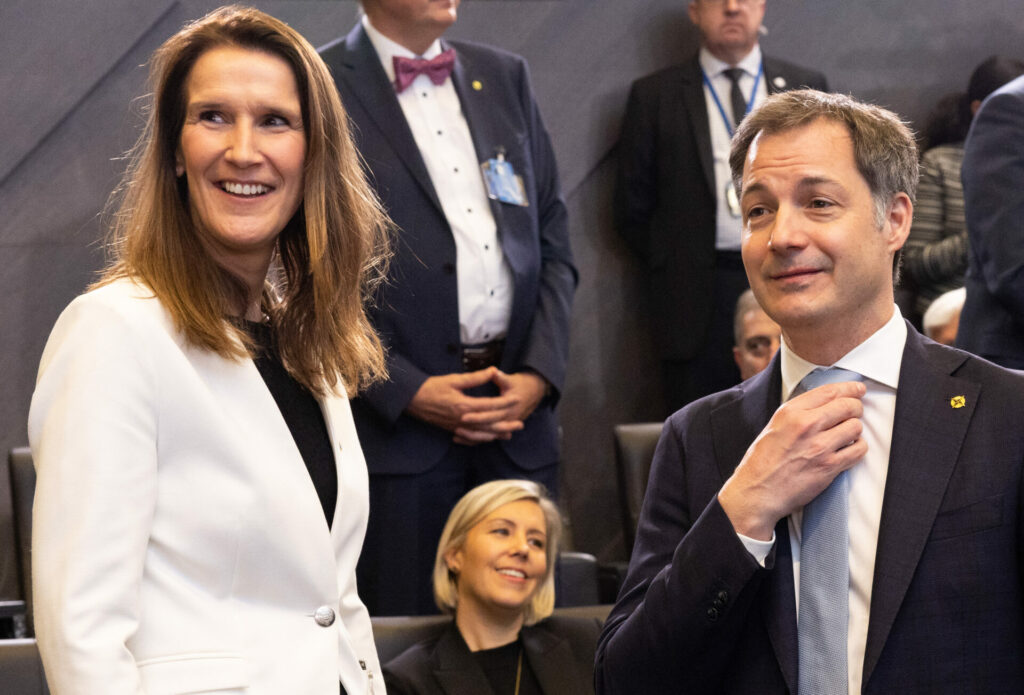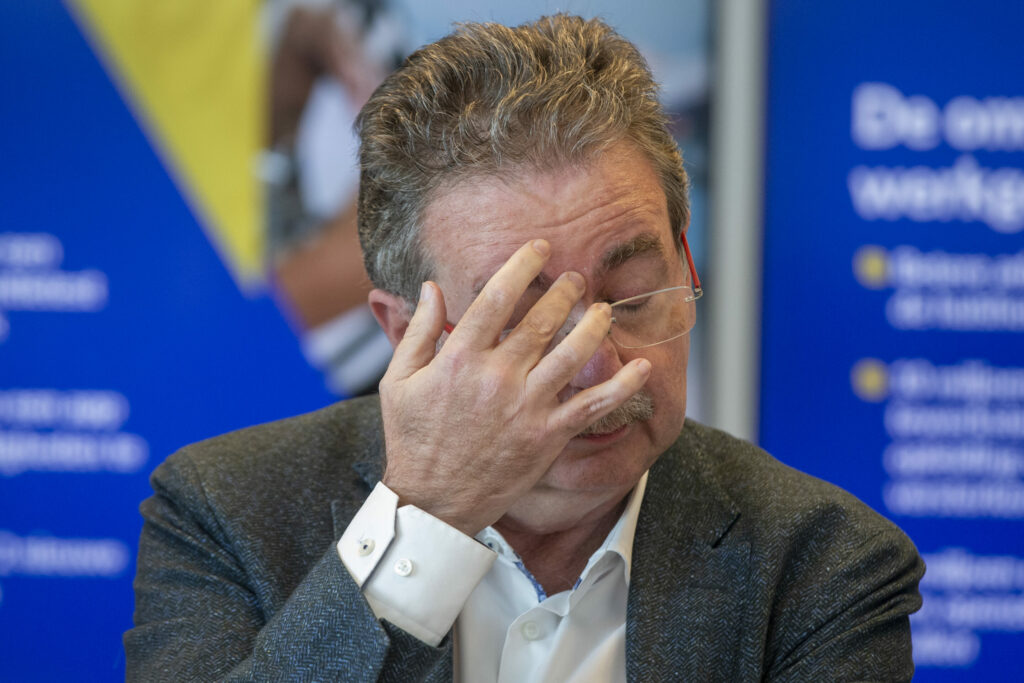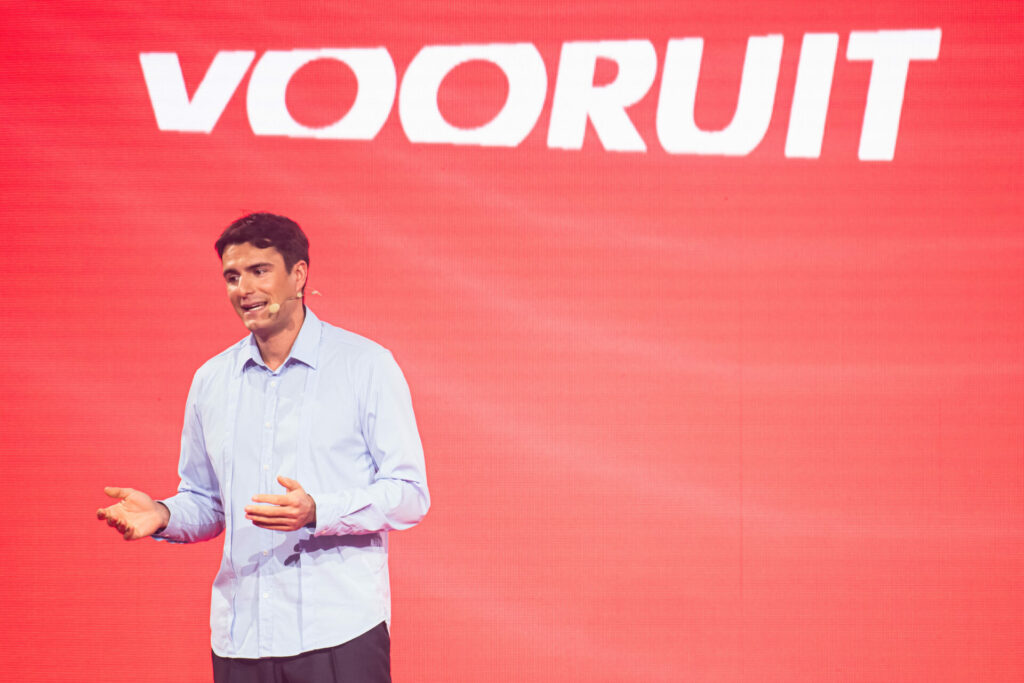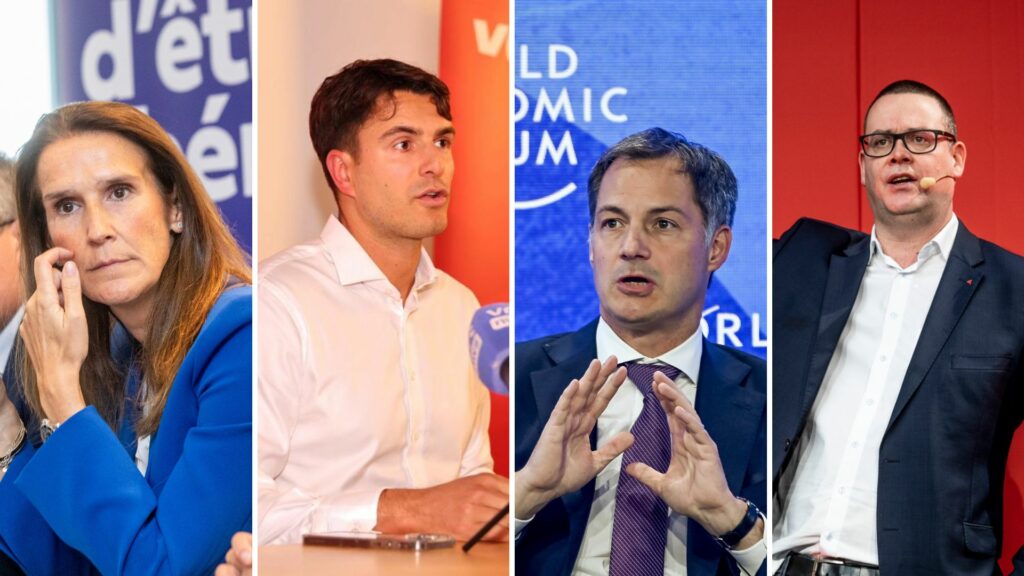With just over six weeks to go to the elections, the latest poll asking for Belgians' favourite political figures was marked by the rise of Sophie Wilmès (MR) in Wallonia and the fall of Conner Rousseau (Vooruit) in Flanders.
The Kantar poll for RTBF and La Libre was conducted between 8 and 18 April and asked nearly 3,000 people living in Wallonia, Brussels and Flanders to rank a number of politicians.
Wallonia: Wilmès comeback
In Wallonia, former Prime Minister Wilmès – who took a step back from her duties as Foreign Affairs Minister in April 2022 to care for her husband (who has since passed away) after he was diagnosed with an aggressive brain cancer – is back in first place with a popularity rating of 57.3%, a significant increase of 7.3 percentage points on the previous survey.
Current Prime Minister Alexander De Croo (Open VLD) moved into second place, with PS leader Paul Magnette remaining in third.
One of the surprises of the poll is the rise in popularity of Maxime Prévot, leader of Les Engagés. With an increase of 7.2 points, Prévot ranked fourth and is positioning himself as an influential political figure in Wallonia.

Sophie Wilmès (left) and Belgian Prime Minister Alexander De Croo. Credit: Belga/Benoit Doppagne
Meanwhile, established socialist political figures such as Francophone Elio Di Rupo (PS) and Flemish Frank Vandenbroucke (Vooruit) recorded falls in popularity, with respective decreases of -3.8% and -3.0% compared to the previous survey.
Di Rupo's drop in popularity, however, means that he was overtaken by MR leader Georges Louis Bouchez, who grabbed back a few points and now ranks fifth.
The poll also shows some increases for Defence Minister Ludivine Dedonder (PS) now ranking seventh, N-VA leader Bart De Wever in 16th place, and Sophie Merckx of the PTB in 26th place.
Ecolo co-leader Jean-Marc Nollet is the highest-placed green in this ranking, in 20th position. His colleague Rajae Maouane is second last, just ahead of the new face of the Walloon N-VA, Drieu Godefridi.
Brussels: Stability for Wilmès and De Croo, drop for Hedebouw and Vervoort
In Brussels, Wilmès and De Croo maintain their leading positions in the survey, with popularity levels of 56.3% and 54.0% respectively. While Wilmès recorded a slight increase of 1.9 points compared to the previous poll, De Croo posted a more significant rise of 3.3 points. In third place, Magnette remains stable at 37.8%.
The popularity of the two Brussels liberals, former and current Foreign Affairs Ministers Wilmès and Hadja Lahbib (who comes fourth in the ranking), and their leader Bouchez (8th place) partly explains the good score that puts the MR at the top of voting intentions in Brussels.
However, MR's list leader in the Brussels Captial Region David Leisterh did not benefit from this, coming second to last in the ranking.
Here, too, Vandenbroucke and Bouchez suffered significant falls in popularity, with drops of -6.1% and -3.9%, respectively, compared with the previous poll. There was also a significant drop in popularity for PTB leader Raoul Hedebouw and Brussels Minister-President Rudi Vervoort (PS), with respective drops of -6.2% and -6.8% compared to October 2023.

Brussels Minister-President Rudi Vervoort. Credit: Belga/Nicolas Maeterlinck
However, other socialist politicians in the capital, such as Brussels City Mayor Philippe Close (PS) and Dedonder, record increases of 2.8% and 2.4% in popularity.
Meanwhile, De Wever and Minister-President of the French Community Government Pierre-Yves Jeholet (MR), maintained relatively stable levels of popularity. Brussels' Lahbib (MR), Caroline Désir (PS) and François De Smet (DéFi) score higher than they do in Wallonia.
Les Engagés leader Maxime Prévôt, ranks 13th in Brussels – a lot lower than his newly-found fourth place in Wallonia. Similar to Wallonia, however, the leading ecologist is Jean-Marc Nollet, also ranked 20th.
Flanders: Rousseau in free fall
In Flanders, meanwhile, the political landscape is being shaken up, particularly by the fall of Conner Rousseau. The former Vooruit leader was in first place in October 2023 with 43% of Flemish hoping he would play a role, but now he is only in 10th place (31.4%).
De Wever reaped the benefits of this and regained first place, with a popularity rating of 45.2% – representing a significant increase of 3.7 points on the previous poll.
Flemish Work and Economy Minister Hilde Crevits (CD&V) is back in the popularity race with an increase of 4.7 points, ranking second with 41.1%. Her party colleague and Interior Affairs Minister Annelies Verlinden is third, with little change from October 2023.

Credit: Belga/Jonas Roosens
Prime Minister De Croo is stable in fourth place, but the leader of far-right Vlaams Belang, Tom Van Grieken, went up slightly and is now in fifth place with 36.6% in favour (+4.3 pts).
Additionally, Rousseau seems to be dragging his Federal Health Minister Frank Vandenbroucke (Vooruit) down with him; while Vandenbroucke was fourth in October, he now lost 6 points and is now in 9th place, just ahead of his Rousseau.
In addition to Rousseau and Vandenbroucke, Barbara Pas (Vlaams Belang), Matthias Diependaele (N-VA) and Raoul Hedebouw (PTB) were among the politicians to record the biggest falls in popularity, with respective losses of 6%, 4.9% and 4.7% compared with the previous poll.
State Secretary for Asylum and Migration (CD&V) Nicole de Moor, dropped four points to 25th. In Flanders, where immigration remains the number one issue of concern, this poor score is expected to weigh heavily on the party.

